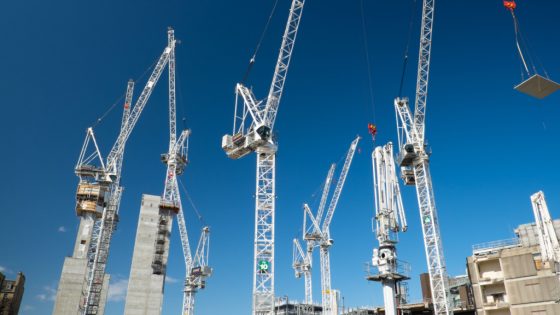Construction activity has increased for a 10th successive month but the pace of growth slowed in December.
The latest S&P Global UK Construction Purchasing Managers’ Index (PMI) registered 53.3 for the final month of 2024, meaning it has stayed above the 50 no-change mark since last March.
But the latest data, released this morning, represented a dip from 55.2 in November and the weakest level of growth in the construction sector since June.
However, it was still higher than the rating of 46.8 recorded for December 2023.
Civils and non-residential building work increased last month, according to the S&P report, although at a slower pace than in the previous period.
Housing activity registered 47.6 on the index, down from 47.9 in November.
Tim Moore, economics director at research specialist S&P Global Market Intelligence, which produces the monthly report after surveying 150 firms, described a “loss of momentum” in the construction sector.
“The slowdown in overall construction output growth reflected more subdued demand conditions in recent months, as illustrated by a further moderation in new order growth during December,” he added.
“Survey respondents commented on headwinds from elevated borrowing costs and the impact of fragile consumer confidence.”
Moore said recruitment picked up in December but subcontractor availability improved to the smallest extent since March 2023 and the rates suppliers charged increased at the fastest pace for over 18 months.
“Concerns about the demand outlook weighed on construction sector growth expectations for 2025,” he added.
“Although confidence recovered after a post-Budget slump during November, it was still much weaker than in the first half of 2024. Many firms reported worries about cutbacks to capital spending and gloomy projections for the UK economy.”
Brendan Sharkey, real estate and construction specialist at accountancy firm MHA, said the slowing of construction growth was “hardly surprising”.
“The industry continues to benefit from the government’s investment in infrastructure but at the same time is hampered by historically high interest rates and an uptick in employment costs,” he said.
“Whether the housing market will see a reversal in fortunes this year remains to be seen, however the opportunity to develop is clearly there given the [government’s] planning reforms.”
Sharkey remained optimistic about this year.
“From what our clients are telling us, 2025 is expected to be better than last year,” he said. “However, it’ll be a slow burn.
“Infrastructure will do well given the government’s investment plans, as will commercial as the UK is becoming an investment choice for many. Housing supply will be available but it’s whether demand will follow if interest rates remain stubbornly high.”
Max Jones, director in the infrastructure and construction team at Lloyds Bank, said the slowing pace of growth “suggests some firms continue to face challenging economic conditions, including inflation”.
He added: “The sector will be hoping to see growth and increased demand, and firms will need to remain focused on managing costs in the months ahead to offset current pressures.
“We are also seeing technology playing a growing role in improving productivity in the sector, and this is expected to remain an important growth lever. Local infrastructure and the role contractors are playing in the UK’s sustainability ambitions could also help to boost order books.”
Josh Ward-Jones, director of Bloom Building Consultancy, said the latest survey showed that housebuilders were being “held back by the high cost of borrowing, weak consumer confidence and patchy demand from buyers”.
He added: “With the fundamentals of housebuilding seemingly stacked against them, many residential developers are holding fire and no amount of relaxation of planning rules will get the new homes Britain needs built.”
Kelly Boorman, national head of construction at consultancy RSM UK, said bad weather and a seasonal slowdown could partly be blamed for drops in activity before Christmas.
She added: “Businesses are also starting to feel the impact of supply chain disruption after multiple significant company collapses in 2024, which has dampened market confidence and caused project delays, leaving many contracts in limbo.”
But Boorman predicted an “uptick in activity” in the first quarter of this year as the government acts to boost building.

